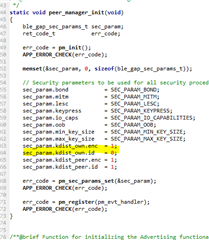Hi,
We are testing mass pairing on our windows machines, as we have seen problems with a high number of paired devices.
I am able to increment the mac address by using sd_ble_gap_addr_set, and saving it in a noinit ram section, and soft reseting the device.
I also erase bonds post reset, and have tried pre reset as well.
I see the advertisement on the incremented mac address, but I receive a pairing error (136 - which from what I have seen, is the result of an invalid state of the PM).
What can I do to fix this?
Thanks!
Roi



